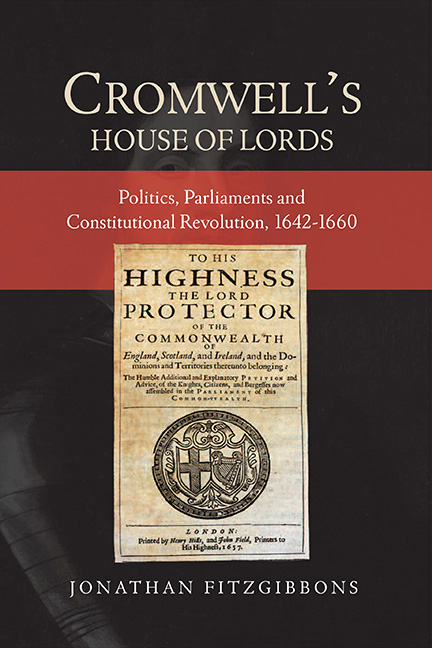Book contents
- Frontmatter
- Contents
- Acknowledgements
- Abbreviations
- Introduction
- 1 Parliamentarian Thought and the Abolition of the House of Lords, 1642–49
- 2 Oliver Cromwell, the Other House and the Humble Petition and Advice
- 3 The Membership of the Other House
- 4 The Other House and the Second Session of the Second Protectorate Parliament
- 5 Richard Cromwell, the Third Protectorate Parliament and the Other House Debates
- 6 The Other House, the Army and the Search for a Settlement
- Conclusion
- Appendix: The Membership of the Other House
- Bibliography
- Index
- Studies in Early Modern Cultural, Political and Social History
2 - Oliver Cromwell, the Other House and the Humble Petition and Advice
Published online by Cambridge University Press: 05 May 2018
- Frontmatter
- Contents
- Acknowledgements
- Abbreviations
- Introduction
- 1 Parliamentarian Thought and the Abolition of the House of Lords, 1642–49
- 2 Oliver Cromwell, the Other House and the Humble Petition and Advice
- 3 The Membership of the Other House
- 4 The Other House and the Second Session of the Second Protectorate Parliament
- 5 Richard Cromwell, the Third Protectorate Parliament and the Other House Debates
- 6 The Other House, the Army and the Search for a Settlement
- Conclusion
- Appendix: The Membership of the Other House
- Bibliography
- Index
- Studies in Early Modern Cultural, Political and Social History
Summary
The parliamentary constitution of 1657 is well known for its offer of kingship; it is usually taken to mark the best opportunity of the 1650s to secure a lasting settlement by returning to the ‘known’ ways of the ancient constitution. While the issue of why Cromwell refused the Crown is a staple of historiographical debate, a number of recent studies have focused on why he was offered the Crown in the first place. The bifurcation of Cromwell's supporters into ‘military’ and ‘civilian’ groups and the emergence of a ‘kingship’ party during the second Protectorate Parliament are attributed to a growing weariness with the arbitrary nature of the regime. The Humble Petition and Advice offered the chance to escape the army's malign influence and reach a settlement acceptable to the nation at large.
This focus on factional manoeuvring has meant that the man at the centre of the debate is often overlooked. The caricature of a Machiavellian Cromwell scheming for the Crown is largely absent from recent studies thanks to a growing appreciation of the providential dimension of political thinking in the 1650s. Yet, there are few detailed examinations of what Cromwell actually wanted from settlement. This chapter contends that to understand Cromwell's aspirations one must look beyond the kingship issue and concentrate instead upon the scheme to restore bicameral parliaments.
As the first part of this chapter demonstrates, the proposed second chamber offered remedies to problems that had plagued Cromwell since the late 1640s. Indeed, there is reason to believe that Cromwell not only supported the return of bicameral parliaments but was also instrumental in bringing the scheme to fruition. The second half of this chapter offers a new perspective on the evolution of the parliamentary constitution of 1657 and those groups that supported and opposed it. It appears that those who backed the offer of kingship were less united over the proposal to revive a second chamber; few, if any, sought a straightforward restoration of the defunct House of Lords. Equally, those who opposed the proffered kingship were not against the idea of a nominated second chamber.
- Type
- Chapter
- Information
- Cromwell's House of LordsPolitics, Parliaments and Constitutional Revolution, 1642–1660, pp. 36 - 77Publisher: Boydell & BrewerPrint publication year: 2018



